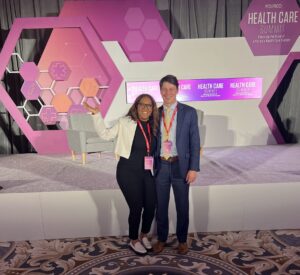 CURA’s Vice President of Digital Marketing, Preston Knowles and Account Supervisor, India Hinton, joined top government officials, lawmakers, and health policy experts as they descended on DC on June 7th to attend POLITICO’s Annual Health Care Summit.
CURA’s Vice President of Digital Marketing, Preston Knowles and Account Supervisor, India Hinton, joined top government officials, lawmakers, and health policy experts as they descended on DC on June 7th to attend POLITICO’s Annual Health Care Summit.
It was a day full of meaningful discussions and engagements around the state of health care in our country. Here are their takeaways from the event:
COVID-19 propelled advancements and improvements in health care
All the speakers brought attention to the advancements and improvements in health care, propelled by COVID-19. Dr. Gupta, White House Director of National Drug Control Policy, Sarah Arora, CGO of GoHealth Urgent Care, and Sen. Tammy Baldwin all noted the growing gap in accessible health care in rural communities and the vulnerability of certain populations. Some of the details included reaching the incarcerated with opioid addiction treatment, increasing access to affordable high-speed internet, in essence, finding a way to reach people where they are at. We can expect private capital to begin assuming more of these investment risks, as health care continues to remain underfunded – especially in vulnerable communities.
As a strategic communications firm passionate about transforming health care, we are excited to see how digital and AI are beginning to shift how we approach health care for the patient – and system(s). We can expect continued and exponential growth in digital care within the next 5-10 years, where remote monitoring, predictive technology, advances for at-home care, and diagnostics will be even more digitized. Digital health care will reduce costs both for the health care providers and patients, and increase access. But this requires platforms that can be kept up-to-date with the latest medical information and providing digital literacy to patients accessing through these mediums.
AI is the talk of the town, but the consensus is we need to proceed with caution
Shannon Klinger, Chief Legal Officer & President at Moderna Charitable Foundation, in speaking about AI said, “The most important word regarding AI is ‘and.’ We have to balance protecting patients and protecting people AND understand that this new technology, whether its generative AI, whether its automation, whether its machine learning, will absolutely allow us to bring life changing medication to patients faster.”
AI has the ability to remove administrative load, be applied to diagnostics, communicate with patients, quickly process data, take away the administrative responsibilities from health care providers allowing them to focus on their work, reduce provider burnout, and save costs.
The legal and ethical challenges faced by the introduction of AI is the biggest issue when it comes to using this technology in the health care setting. There is a need for robust ethical guidelines to ensure there are racial and bias checks in place and to continue to decrease racial disparities. Chris Ross, CIO at Mayo Clinic, stated that AI works using augmented intelligence (human and AI working together) vs. automated intelligence (independent AI).
No more silos. We will only make progress through collaboration.
Our greatest takeaway is the importance of establishing interagency collaborations. This was highlighted by Rep. Jamaal Bowman’s discussion about racial disparities in health care. With health care systems and processes being as complex and broken as they are, everyone in the health care realm—both in the public and private sector—must work together to connect care, education and community resources to ensure access to quality care for all.
We will continue to stay plugged in to recent technology advances and the newest public guidance in health care, making sure our clients don’t fall behind either.
If you are interested in learning more about these takeaways or working with us to implement and understand the new advances in health care, contact us.
